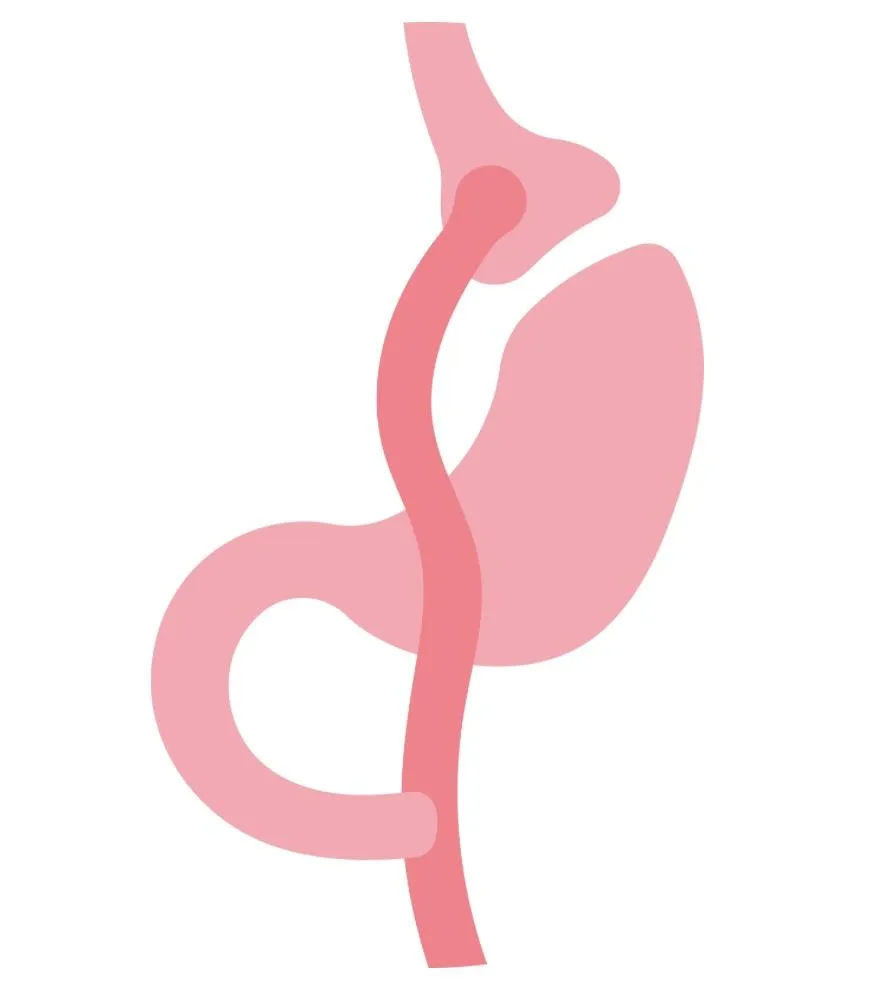Paul D. Bailey, III, MD
Roux-en-Y Gastric Bypass
Bypass Overview
The gastric bypass, or Roux-en-Y gastric bypass, is one of the oldest weight loss surgeries still performed. As a result, the bypass has the longest set of data to support the procedure. The procedure involves making a small functional stomach, about the size of an egg, which can hold approximately 4 ounces. After surgery, the intestines are rearranged by connecting the stomach to the middle of the intestines and making a connection further down to another section of intestines. This bypasses the first part of the intestines which are no longer used for digestion.

How Does the Bypass Work?
The bypass works in multiple ways to help patients lose weight. First, the stomach is made much smaller, which helps restrict the amount of food and calories consumed, leading to weight loss.
Also, the rearrangement of the intestines adds a malabsorptive component to the procedure. The first part of the intestines no longer have food passing through them and cannot absorb nutrients or calories from food eaten.
Lastly, the hormonal effects of bariatric surgery also help to increase fat burning, and patients lose large amounts of weight as a result.
Dr. Bailey offers comprehensive weight management care and bariatric and general surgery to patients in northeast Florida and Georgia. Dr. Bailey and his team understand how challenging it can be to begin your wellness and weight loss journey. We will work together to create a personalized plan that’s right for you.
What weight loss can I expect?
Everyone will experience weight loss differently after bariatric surgery. There are a number of factors that will contribute to your weight loss, including underlying health conditions, ability to maintain appropriate diet and activity levels postoperatively, and follow-up with your bariatric program. The average weight loss seen after a bypass is about 70% of your excess weight. This is maintained several years after surgery.
What is the recovery like?
Everybody recovers from surgery at their own pace. There is an average two-night stay in the hospital, although some people are able to leave after one night. We will monitor your bloodwork, vitals, and hydration status. There may be some nausea on the day of surgery, but postoperative pain is usually minimal and both of these improve by the first day after surgery. We will send you home when you are able to take enough fluids to keep yourself hydrated at home without IV fluids. If you require extra time, that is OK. We will not discharge you from the hospital until you are ready to succeed at home.
What are the risks?
Thankfully, bariatric surgery, including the bypass, has become quite safe. However, there are still risks of complications, as is the case with any surgery. Some of the most common complications with the bypass include blood clots in the legs; blood loss; breathing problems; heart attack or stroke during or after surgery; infection; ulcers; injury to the stomach intestines or other organs during surgery; leakage from the staple lines; poor nutrition; scarring inside the abdomen that could lead to a future blockage in the bowel; and vomiting.
Contact Us
We will do our best to contact you within a few business days. If you need immediate assistance, please contact 904-296-4141. If you are experiencing a medical emergency, please call 911.
.
Paul D. Bailey, III, MD
SERVICES
OFFICE HOURS
Monday: 8:30 AM–4:30 PM
Tuesday: 8:30 AM–4:30 PM
Wednesday: 8:30 AM–4:30 PM
Thursday: 8:30 AM-4:30 PM
Friday: 8:30 AM–12:30 PM
Saturday and Sunday-Closed
Disclaimer: This website does not provide medical advice. This website including but not limited to text, graphics, and other materials contained on the website are for informational purposes only. No material on the site is intended to be a substitute for professional medical advice, diagnosis, and/or treatment. Always seek the advice of your treating physician or other qualified provider with any questions you have related to your care or condition. Do not delay care or disregard medical treatment due to any content housed on this website.
**Weight-loss results may vary for each individual, and specific results are not guaranteed.